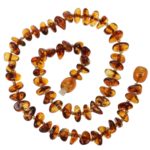Growing first teeth are often a source of anxiety for parents and baby. Parents can consult a large number of resources that can be helpful, but it is often difficult to make the right choice.
Milk teeth in children are important as much as the permanent teeth in adults. They usually grow between the fifth and twelfth month of the child’s life. The first teeth help children chew and speak. Six months after the springing of the first tooth, it is recommended going to the dentist, and it certainly should be done before the first birthday of the child.
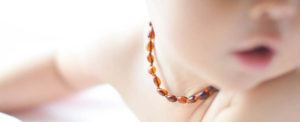 When the first teeth start to grow, some baby’s gums become sensitive and painful. Gently massaging the gums with a clean finger, chilled spoon or a wet gauze can soothe the baby. You can use special gels containing lidocaine which slightly anesthetize the gums, and the baby will not feel irritation with her sprouting teeth. The child can also be given a teether, or an amber necklace.
When the first teeth start to grow, some baby’s gums become sensitive and painful. Gently massaging the gums with a clean finger, chilled spoon or a wet gauze can soothe the baby. You can use special gels containing lidocaine which slightly anesthetize the gums, and the baby will not feel irritation with her sprouting teeth. The child can also be given a teether, or an amber necklace.
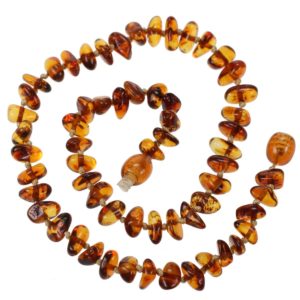 The effectiveness of these necklaces are questioned by many people, especially health professionals, but many parents still use them and consider them very effective. It is considered that activity of amber necklaces depends on the presence of succinic acid.
The effectiveness of these necklaces are questioned by many people, especially health professionals, but many parents still use them and consider them very effective. It is considered that activity of amber necklaces depends on the presence of succinic acid.
If none of this helps, and the child is still moody and cranky, you should consult your pediatrician or dentist. Otherwise, most children grow all twenty baby teeth in the first three years.
Baby Teethers
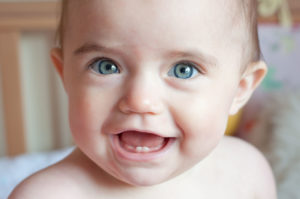
Baby teethers have existed for thousands of years, and the oldest written records of them are on the Sumerian plates three thousand years old. The ancient Egyptians used the teethers made out of coral, while during the seventeenth and eighteenth centuries wax candles and sweet root soaked in honey were popular. In the nineteenth century the first teethers made of rubber were created. Dentists have been explaining that the teethers are very good for children’s teeth because the teethers encourage and accelerate teeth growth. Read also our baby teether review for top recommendations for baby teethers.
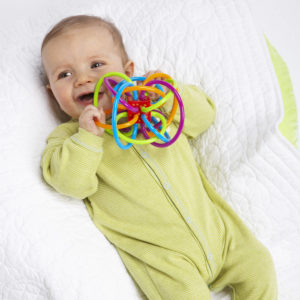 Lower temperature on the gums reduces the pain of sprouting milk teeth, so the teethers that are cooled down are useful for children. There are teethers which are filled with water, and cooled in the fridge, and there are those that are filled with chloroethyl which do not have to be put in the fridge and are cooled by kneading.
Lower temperature on the gums reduces the pain of sprouting milk teeth, so the teethers that are cooled down are useful for children. There are teethers which are filled with water, and cooled in the fridge, and there are those that are filled with chloroethyl which do not have to be put in the fridge and are cooled by kneading.
Nonetheless, teethers filled with water should not be cooled in the refrigerator because they become too hard, so baby can get hurt, and also teether itself could break. Other teethers, which do not have cooling are also very helpful because each teether promotes the growth of the teeth. It is very important that teethers are certified and from reputable manufacturers, because babies can bite off a regular rubber. Teethers should not be damaged because sharp edges can injure the gums of the child.
Teethers should be washed before and after use. Parents should always be careful to pay attention to the hygiene of the teethers.
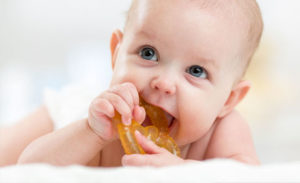
Besides teethers, pacifiers, as well as nipples on bottles are also very important for the development of the jaw of a little child before and during the sprouting of teeth. They must not disrupt the normal growth and development of the upper and lower jaw of a child, and they should only be chosen according to monthly age. For nipples on the bottles, slots are very important. They must not be too broad, because it is essential that a baby sucks from a bottle to work out her muscles of the face and tongue, which in turn stimulates the development of other muscles of a child. It is essential that pacifier and teether feel good for the child and correctly influence his or her development.
If it is necessary to use a pacifier, it should be stopped before the appearance of first milk teeth, which is between the sixth and eighth month of life of the child. For the pacifier it is important that it is anatomical, clean, that it is often replaced, that it is not nibbled, cracked and cut because in these cracks often germ infection can be found.
Dental care is extremely important and it is wrong for the people to think that milk teeth are not important. As soon as the first tooth had sprouted, it should be monitored.
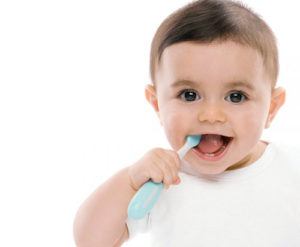
Modern dentistry considers that the child’s teeth should be brushed every night, during the bath or before bedtime. And should be continued to do so until the age of twenty months, when the morning brushing should be introduced. Brushing should be assisted by the parents, of course, because children under eight years of age are not able to brush their teeth properly. The toothbrushes should be changed once in about two weeks and it is better to buy cheaper ones, but change them more often than a more expensive one and use it longer.
Gels For The Sore Gums
On the market there are medicines, as OTC products, that can be used to reduce irritation and unpleasant sensation for babies during the cutting of the first teeth. They contain a local anesthetic lidocaine in low concentrations (0.33%), which relieves pain that occurs when teeth are sprouting. Moreover, these drugs can also contain mild antiseptics (cetylpyridinium chloride, chamomile extract).
They can be used several times a day, at intervals, preferably after feeding the baby and before bedtime. They are applied in a small amounts and are rubbed on the painful area of the gums. These gels or drops should not be used with children under the age of three months. Side effects of these drugs are very rare, and among them is most common hypersensitivity to certain ingredients of the drug. If there is swelling, redness or rash on the baby, the drug should be stopped immediately.









